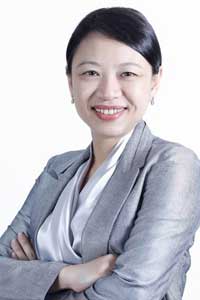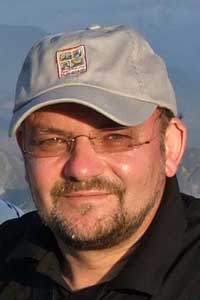|
Keynote Speakers
| Title |
Speaker |
Date / Time |
Download |
Now that ITS are as effective as human tutors, how can they become even better? |
Professor Kurt VanLehn, Ph.D. |
November 30th, 2011
(09:30 - 10:30) |
 presentation slide presentation slide
[November 17, 2011]
|
Lessons-Learned in Technology, Pedagogy and Education |
Tinsiri Siribodhi, Ph.D. |
November 30th, 2011
(16:00 - 17:00) |
 presentation slide presentation slide
[November 30, 2011]
|
The Ecology of Resources, a Pedagogy of Plenty for Contextualized Learning |
Professor Rose Luckin, Ph.D. |
December 1st, 2011
(09:00 - 10:00) |
|
Applications and Benefits of Network Analysis in Technology-Enhanced Learning |
Professor Dr. H. Ulrich Hoppe |
December 2nd, 2011
(09:00 - 10:00) |
 presentation slide presentation slide
[November 17, 2011]
|
|
| |
|
| Back to top |
 Now that ITS are as effective as human tutors, how can they become even better? Now that ITS are as effective as human tutors, how can they become even better?
|
|
|
| |
 |
Abstract: It is often said that human tutors are 2 standard deviations more effective than classroom instruction and that ITS are 1 standard deviation more effective. This hypothesis, which inspired many important studies of human tutoring and many efforts to replicate human tutoring with natural language tutoring systems, now seems false. Although research continues, the current best fitting hypothesis is that both human tutors and ITS have the same effect size, namely 0.75 standard deviations above no-tutoring instruction. The first part of the talk will support this claim with a meta-analysis of relevant experiments, illustrated with specific experiments from several labs. However, this finding does not imply that ITS researchers should declare victory and retire. The studies found that both human tutors and ITS were far from perfect. ITS researchers should continue to try to achieve a 2 standard deviation effect size. The second part of the talk discusses three methods with promising preliminary results: (1) using machine learning to improve tutorial decision making; (2) teaching and fading an explicit meta-cognitive strategy; and (3) prompting reflection during problem solving.
|
Professor Kurt VanLehn, Ph.D. (C1)
School of Computing, Informatics and Decision Science Engineering at Arizona State University, USA
|
Kurt VanLehn is a Professor in the School of Computing, Informatics and Decision Science Engineering at Arizona State University. He received a Ph. D. from MIT in 1983 in Computer Science, was a post-doc at BBN and Xerox PARC, joined the faculty of Carnegie-Mellon University in 1985, moved to the University of Pittsburgh in 1990 and joined ASU in 2008. He founded and co-directed two large NSF research centers (Circle; the Pittsburgh Science of Learning Center). He has published over 125 peer-reviewed publications, is a fellow in the Cognitive Science Society, and is on the editorial boards of Cognition and Instruction, and the International Journal of Artificial Intelligence in Education. Dr. VanLehn's research focuses on applications of artificial intelligence to education. Some of his projects are, starting from the most recent ones: LAITS, a system to help student learn by authoring intelligent tutoring systems; AMT, a meta-tutoring system combined with an affective learning companion; Why2-Atlas and Cordillera, two intelligent tutoring systems that pioneered the use of natural language dialogues for science teaching and have been shown to be just as effective as expert human tutors; Pyrenees, an intelligent tutoring system that successfully caused inter-domain transfer by implicitly teaching a meta-cognitive strategy; Andes, an intelligent tutoring system for a full year of college/high school physics that improves students grades by approximate a letter grade and is in daily use around the world; and Cascade, a highly accurate cognitive model of human students learning physics that accounts for the interaction of self-explanation and analogy.
Back to top |
|
| Back to top |
 Lessons-Learned in Technology, Pedagogy and Education Lessons-Learned in Technology, Pedagogy and Education |
|
|
| |
 |
Abstract: We are now in the 21st century, we have been integrating technology in education for many centuries. With the high potential of technology to enhance and improve quality of Education, technology is considered a promising tool. What have we learned from integrating technology into Education from the past centuries? Based on the ICT in Education projects of UNESCO Asia-Pacific Regional Bureau of Education and the SEAMEO Report of ICT integration in Southeast Asian Countries, a publication of the Southeast Asian Ministers of Education Organization, this presentation will provide the synthesis of key lessons learned from integrating technology in Education in Southeast Asia region.
The presentation will point out the key success factors and issues that need to be considered when integrating technology into education, particularly pedagogy. It is hope that by sharing the lessons-learned from these practices, policy makers will be able to formulate appropriate policy to support technology in education; and educators and teachers will be able to make the best use of technology to improve teaching and learning to benefit their students.
|
Tinsiri Siribodhi, Ph.D. (Thailand)
Deputy Director, Administration and Communication
Southeast Asian Ministers of Education Organization Secretariat
(SEAMEO Secretariat), Thailand
|
Dr. Tinsiri Siribodhi has a BA degree in English from Chulalongkorn University, an MA degree in Teaching English as a Second Language from Central Missouri State University and a PhD in Educational Technology from University of Kansas. She currently serves in many roles including the deputy director (administration & communication) of the Southeast Asian Ministers of Education Organization (SEAMEO), Thailand, a sub-committee member of the Senate Educational Committee for Preparing Thai Citizen for ASEAN Community by 2015, a committee member of the International Best Practice Award of University in Thailand, Office of Higher Education Commission, Ministry of Education, a committee member of the I-Award (International Relation Award) Project of Universities in Malaysia, Indonesia and Thailand, and an executive committee member of the Information Technology Projects under Her Royal Highness Princess Maha Chakkri Sirindhorn (www.princess-it.org).. Dr. Siribodhi’s key areas of strength include Regional cooperation, Educational Policy and Development, Capacity Building for Teachers and Education Administrators, ICT in Education, ICT for Development, and Education for Sustainable Development.
Back to top |
|
| Back to top |
 The Ecology of Resources, a Pedagogy of Plenty for Contextualized Learning The Ecology of Resources, a Pedagogy of Plenty for Contextualized Learning |
December 1st, 2011
(09:00 - 10:00) |
| |
 |
Abstract: In this talk I will discuss the concept of Context and its relationship to learning with technology. Context is a complex concept (Nardi, 1996) and one that is difficult to ‘pin-down’ in a way that can be used to inform the design and use technology to support learning. Research from the past decade has been drawn together in the formulation of The Ecology of Resources, which is a model of context that is grounded in a definition of context that conceptualizes a learner’s context as their lived experience of the world. Context is not something that a learner is exposed to, but rather a dynamic evolving entity that reflects a learner’s interactions with the people, artefacts and environments they encounter. The Ecology of Resources model is used as the basis for a 3-phase design framework that drives a participatory design process. I will briefly present the framework and will discuss the recent projects in which it has been used to design ways in which learners and teachers can be supported to take best advantage of the plentiful resources, including technologies, that are available to support their learning and teaching.
|
Professor Rose Luckin, Ph.D. (C6)
Learner Centred Design at the London Knowledge Lab, UK
|
Professor Rosemary Luckin is a Professor of Learner Centred Design at the London Knowledge Lab. Her research explores how to scaffold learning across multiple technologies, locations, subjects and times. This work applies participatory methods to the development and evaluation of Technology for learning. It is interdisciplinary, calling upon education, psychology, artificial intelligence and HCI to investigate the relationship between people, their context, the concepts they are learning, and the resources at their disposal. In her latest book “Re-designing Learning Contexts”, published by Routledge in 2010, Professor Luckin explores the meaning of Context, it’s relationship to learning and the manner in which we can develop technology rich contextualized learning activities that meet each learners needs.
Professor Luckin has a Bachelor degree in Computer Science and Artificial Intelligence and a PhD in Cognitive Science, both from the University of Sussex. She was appointed by the Secretary of State for Education to the board of Becta: the Government sponsored organization that until 2011 lead the UK drive for ICT in education. Professor Luckin works closely with users and beneficiaries of research that have included various UK Government departments and the BBC. She has taught in a variety of educational sectors including schools, and Further and Higher Education. She is a member of the governing body of St Paul’s Public School in London, one of the leading academic schools in the United Kingdom.
Back to top |
|
| Back to top |
 Applications and Benefits of Network Analysis in Technology-Enhanced Learning Applications and Benefits of Network Analysis in Technology-Enhanced Learning
|
|
|
| |
 |
Abstract: Particularly in the area of computer-supported collaborative learning, the methodology of social network analysis (SNA) has gained considerable attention. It has been used to identify roles and internal structures in learning groups and is an important tool to provide information and insight for managing learning communities. With a formal basis in mathematical graph theory, SNA has a long history in social psychology and sociology. Under the heading of "network science", graph-theoretical models and analyses of network structures have recently been extended beyond social networks. The extended scope includes the evolution of technical networks (such as the WWW) as well as biological or semantic networks. The model of "scale-free networks" based on the mechanism of "preferential attachment" explains important differences in the evolution of real-world networks as opposed to the characteristics of randomly wired graphs. It will be shown that these models and analytic mechanisms are also relevant in various areas of technology-enhanced learning with examples taken from semantic modeling as well as from learning and competence development in online communities.
|
Professor Dr. H. Ulrich Hoppe (C2)
Department of Computer Science and Applied Cognitive Science (Engineering Faculty) at the University of Duisburg-Essen, Germany
|
H. Ulrich Hoppe holds a full professorship for “Cooperative and Learning Support Systems” in the Department of Computer Science and Applied Cognitive Science (Engineering Faculty) at the University of Duisburg-Essen, Germany. With an original background in mathematics, physics and educational technology (PhD from Tübingen University in 1984), Ulrich Hoppe has been working for more than ten years in the area of Intelligent User Interfaces and Cognitive User Models (1984-95), before he re-focused his research on technology-enhanced learning and knowledge management. He joined the University of Duisburg as a professor in 1995 and founded the research group COLLIDE on Collaborative Learning in Intelligent Distributed Environments in the same year.
With the COLLIDE group, Ulrich Hoppe has been engaged in several European projects in the area of advanced computational technologies in education. In 1998, he initiated the NIMIS project on developing innovative classroom technology for early learning in the framework of a European programme on “Experimental School Environments”. The specialty of NIMIS was the combination of a computer-integrated classroom environment with new interaction techniques (pen-based input, speech output) and intelligent analysis and support. Following up on NIMIS, the project SEED in the EU programme ”School of Tomorrow” was orientated towards engaging teachers in innovative forms of using interactive media in their lessons. Ulrich Hoppe has been the coordinator of the EU project COLDEX (”Collaborative Learning and Distributed Experimentation”, 2002-05) which dealt with supporting globally distributed learning communities in science and technology. Currently, the COLLIDE group participates in the European project SCY (“Science Created by YOU”) on supporting collaborative inquiry learning in higher education. Recently, Ulrich Hoppe has also been engaged in national projects on open innovation and competence development in the different industrial sectors.
Ulrich Hoppe is a member of the Executive Committee of the International Artificial Intelligence in Education Society. He has been programme co-chair of CSCL 2003 in Bergen (Norway) with Sten Ludvigsen, AIED 2003 in Sydney (Australia) with Felisa Verdejo, and ICCE 2007 in Hiroshima (Japan) together with Shelley Young and Tsukasa Hirashima.
His current research interests are
- Interactive and collaborative media for learning and knowledge construction
- Integrating mobile and wireless technologies with various teaching/learning scenarios
- Analysis, modelling, and intelligent support of interactive and collaborative learning processes
- Social network analysis and community support
Back to top |
|
|




